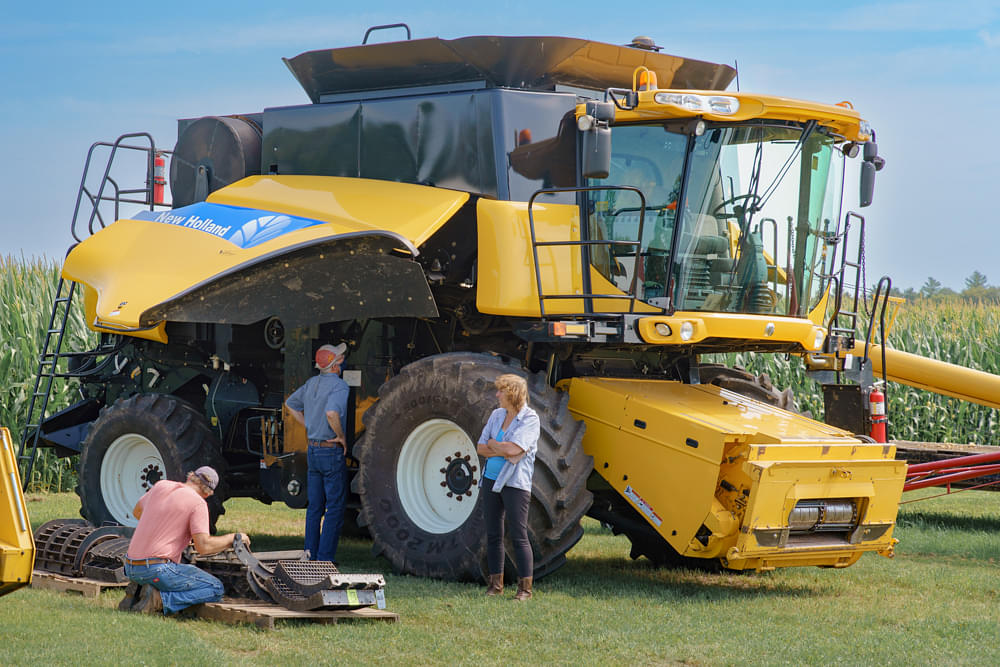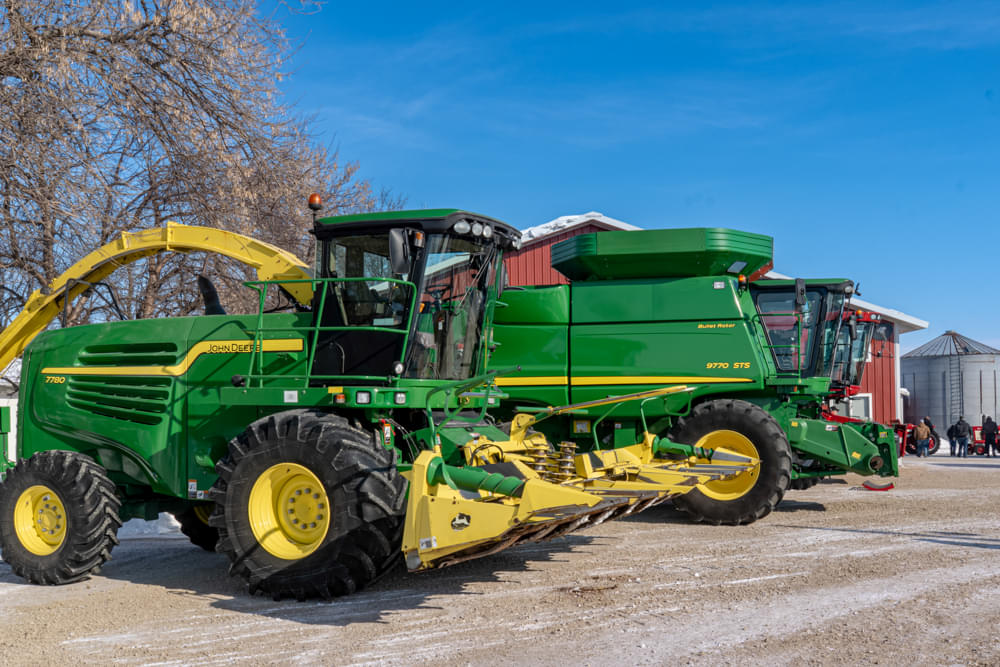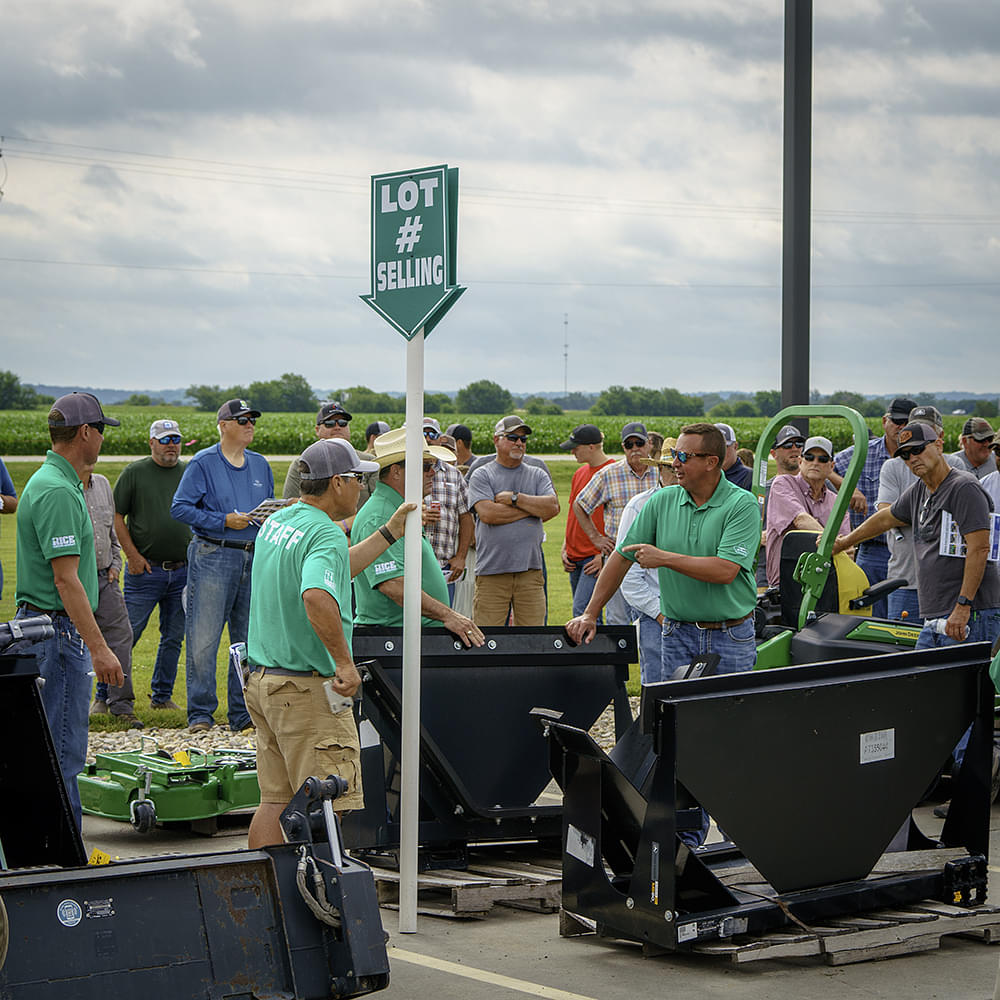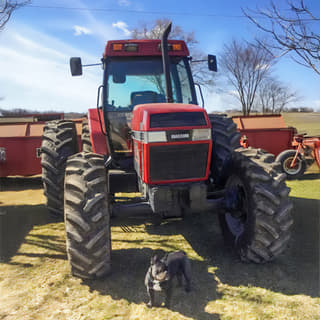AUCTIONS
Live vs. Online Farm Equipment Auctions
Ryan Roossinck
October 18, 2024
Farm equipment auctions used to be pretty simple. You drove to the auction, raised your hand until you won the bid, paid for your stuff, and took it home. Today, it’s not that easy. With online farm equipment auctions now being more popular than ever, it can really be confusing – especially if you’re new to it.
It doesn’t have to be, though. Here’s a quick synopsis of each type of equipment auction, as well as a few helpful hints as you decide which type is best for you.
Live farm equipment auctions

The traditional live farm equipment auction has a lot of upsides. Live farm equipment auctions allow you to:
Get up close and personal with the equipment
This is one of the most critical parts of the auction buying process. If you want to crawl underneath a mid-sized Kubota tractor to check for leaks, go for it. Want to inspect under the side shields of a New Holland combine? You can do that, too. These are all things you can (and should) do at live auctions.
Chat up the seller or auctioneer
Ask any questions you want about the machinery and/or auction. It’s in everybody’s best interest that questions get answered because it creates better-informed, more confident buyers.
Listen to the locals
You’re not being nosy or eavesdropping. Listening in can sometimes be the most telling bit of research you can do. See, the locals know things that no amount of internet research or day-of inspection can tell you. They remember the day John bought that row crop tractor fifteen years ago, and they remember when his boy was running it a few years later and found a wet spot in the field…and how the MFWD never worked quite right after that.
Lastly, live farm equipment auctions can be fun! They have an element of entertainment and showmanship to them. A good auctioneer can build a lot of excitement and energy, and that often translates to more bidding – which is good for the seller. Plus, who doesn’t enjoy listening to an auctioneer with a great chant?
Now, that having been said, live farm equipment auctions have a few downsides, too. They usually require the following:
Travel
If the auction is in the middle of Timbuktu and it’s got the piece of equipment you want, you’re going to have to make a road trip – which is inconvenient if you don’t actually live in Timbuktu.
Time
Even if a live auction is only fifteen minutes away, depending on how big the auction is, you may end up killing the better part of a day to attend it.
Weather-watching
Weather is always a factor. Rain or shine, you’re probably going to have to put up with it because more often than not, you’re walking with the auctioneer from piece to piece. Plan accordingly.
More thorough searching
Live auctions (unless they’re huge consignment sales) often don’t have the same kind of selection that you can get from searching an online bidding platform, so you’ll have to look at more auction platforms to find what you’re looking for. (Shameless plug: Tractor Zoom can help you find the right used farm equipment faster.)

Lastly, if you do end up buying that New Holland combine or Kubota tractor, you normally have to take it with you when you leave. That means you need to bring whatever it’ll take to haul it home.
That about sums it up for live auctions. Now let’s take a look at online farm equipment auctions.
Online farm equipment auctions

Online farm equipment auctions have their fair share of advantages – but they also have some significant challenges, too. Let’s dig in.
Online auctions are, in one word, convenient. Consider the following benefits:
Bid from anywhere
The bathroom, the beach…basically anywhere you’ve got an internet connection and a device to get online.
Browse a wider selection
When you go to a typical retirement auction, you’re limited to that farmer’s line of equipment. Online auction platforms have more equipment. Instead of a 4440, you’ll be able to choose from a dozen.
Set it and forget it
If you put in your max bid, the auction platform can keep track of that so you don’t have to remember it. Opinions vary about whether or not this strategy works, but it is helpful when you’ve got a lot going on.
However, they do come with some challenges.
It’s tough to thoroughly inspect machinery on the internet
You’re essentially relying on auctioneer photos, videos, and written descriptions – which may not always be 100% accurate or complete. Furthermore, you don’t get the benefit of the “local perspective” that you’ll get at onsite auctions.
You’re at the mercy of technology
Bidding from a beach chair is great, but if you lose signal (or the auction platform has a glitch), there’s not much you can do.
Shipping can be spendy
even for smaller stuff. You also don’t have the luxury of oversight when it comes to loading. You can’t smack the chains and declare with authority, “That ain’t goin’ anywhere.”
However, there are a few steps you can take to mitigate all of this.
Helpful tips for online farm equipment auctions
While there’s not much any of us can do about the technology side or the cost of shipping, there are a few things you can do to make sure you have a greater chance at getting the machinery you want at the price you’re aiming for. Here are a few suggestions.
Register for the online auction well in advance of the scheduled close
This is usually a pretty quick and painless process. However, once in a while you’ll run into an auctioneer or a platform that includes a manual step in the process. You’ll want to allow time for them to do their thing on the other end.
Read the fine print
Auction terms and conditions are typically pretty clear and easy to find. However, a lot of auctioneers will have a few “dummy lots” listed at the top that cover stuff like onsite inspection dates, how they handle auction closing and payments, and pickup procedures. Pay close attention to these. If you have questions, don’t be afraid to pick up the phone.
Fees vary from auction to auction. Read these carefully so you know what the taxes and/or surcharges look like. Once you place a bid on a piece of equipment, you’re on the hook for whatever the terms specify if you win. Auctioneers typically don’t accept ignorance as an excuse!
Do your homework
As mentioned earlier, sometimes the photos and descriptions on an equipment listing leave more questions than answers – it’s the nature of the beast. If you need more details about a piece of equipment, pick up the phone and call the auctioneer – or better yet, call the seller themselves. They know it’s in their best interest to provide the answers you’re looking for. Remember, once you hit that bid button, you’re on the hook, so make sure you get your questions answered.
If you’re on the fence about a piece of equipment, it might be worth asking for another set of eyes on it. If you’re involved in any online forums or social media groups, it doesn’t hurt to ask if somebody local could put you in touch with an independent appraiser who knows what to look for. You’ll probably have to make it worth their while, but if you’re looking at spending good money on something, that peace of mind is probably a wise investment.
Check out the auctioneer. Ask around. Again, social media can be a big help here. You may have to sort out the wheat from the chaff as far as opinions go, but again, peace of mind is priceless.
-Trust your gut. If something gives you heartburn and it keeps nagging at you, don’t bid on it!
Turn on text/email notifications
Do this if you’re watching or actively bidding on something. Nothing can ruin your day like missing a piece of equipment because you got busy doing something else and it slipped your mind.
One other thing to note is that most of the action on an online farm equipment auction will happen within the last hour. Don’t worry too much about it, but understand that it’s just the way things typically work. Also, most if not all auctioneers use some form of a “soft close” to prevent somebody from using a bot service to place a low-ball bid within a few seconds before the bid closes. Typically, if somebody places a bid with less than two or three minutes left, the auction platform will extend the bidding by a set amount of time (usually a minute or two).
Wrapping up…
Even though online farm equipment auctions present some challenges, they’re definitely here to stay – and they’re growing. Their convenience and greater selection have made it easier than ever to find and bid on used farm equipment. Live auctions are still happening, and they’ll likely continue to be a part of our agricultural fabric. But online auctions have weaved their way into that fabric, too.
At the end of the day, it all depends on how much risk you’re willing to take. If you live in Ohio and you’re not comfortable buying a tractor from Nebraska without seeing it first, that’s perfectly okay! There are still plenty of live auctions with inventory that you can see and ask questions about before bidding. Every time you attend an auction, you’ll gain more experience. Over time, maybe you’ll dip your toes into an online farm equipment auction. Maybe not. There’s no “right way” that works for everybody.
The cardinal rules still apply in either case, though. Do your homework, and trust your gut.
That said, there’s one final piece of advice to impart about finding the right farm equipment. Tractor Zoom is the fastest place to find farm equipment at auction (or dealerships, for that matter). We partner with nearly 750 equipment auctioneers across the US to showcase their equipment. Whether the bidding is live or online, we provide you with all the information available about the equipment and auction so you can narrow your search to the right equipment for you. The best part is that it’s all free for buyers to use!
Give it a shot, and go find the equipment you’re looking for!





















